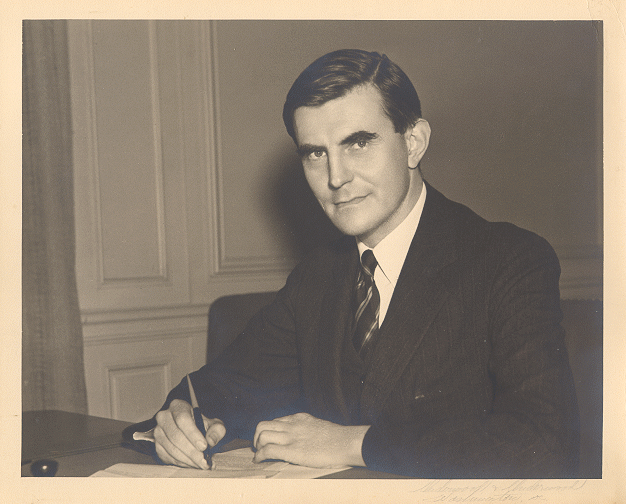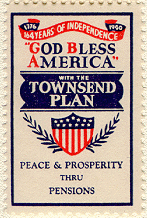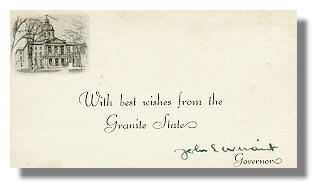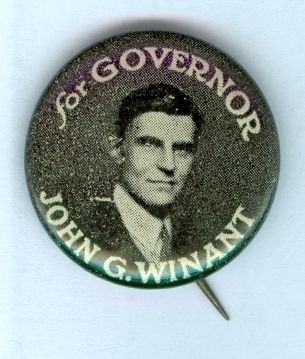

John Gilbert Winant Finally Gets his Due
By DEAN DEXTER
Since I was a boy I have heard talk of John Gilbert Winant, mainly from family and old timers. Occasionally now the name will come up, but only among people interested in obscure footnotes of history. By the time I had come along, “Gil” Winant, as friends called him, was gone, shot himself.
Winant was, “Deep, a brooder, a dreamer,” my grandfather said. The late newspaperman Raymond Smith of New Hampton who covered him, told me Winant was extraordinarily likeable, but bashful. “Could hardly talk.” To President Franklin D. Roosevelt, Winant was “Utopian John.”
The first to serve three terms as New Hampshire governor, Winant was later appointed director of the International Labor Organization in Geneva, then as first chairman of the Social Security Administration, and most notably as U.S. Ambassador to London during World War II, succeeding Nazi sympathizer Joseph P. Kennedy.

John G. Winant, courtesy, Social Security Administration
It is suggested that Winant was Roosevelt’s first choice to be his vice president in 1945, which meant Winant, not Truman would have become president upon FDR’s death that year. But Democrat party bosses, who controlled the nomination, wanted Truman.
John Winant was a liberal Republican of the Progressive Movement, which had its genesis in America at the turn of the century, responsible for such reforms as child labor laws, regulation of public utilities, and anti-trust legislation.
My grandfather, Joseph F. Smith, a Belknap County Commissioner and state representative from Meredith, crisscrossed the state with Winant, promoting the “Townsend Plan” in the 1930s, speaking at church suppers and Grange meetings. The scheme was a revolving public “old age” pension plan similar to what became Social Security. Thus to FDR, Winant’s appointment to head the new agency in 1935 was a natural one.

Winant was a shy, awkward, but hugely engaging person, who identified with common people. While governor during the Great Depression he walked to his State House office, greeting people on his way, handing out money to the Concord poor until his pockets were empty.
The late Charlie Beard, Laconia teacher and state legislator remembered visiting Winant in London on leave during the war. “Coming down the stairs in the embassy, he looked like Abraham Lincoln,” Beard said. Winant was a friend of Beard’s father.
“Winant used to sneak off quietly while on official business at Keene Normal School (now Keene State) to enjoy his favorite pipe in dad’s rocking chair at the heating plant where dad was engineer. Mr. Winant called my dad by his first name, Elmer!” Beard said in a letter.
As Governor, Winant’s youth and popularity with voters raised his profile beyond the Granite State. The national press, including Time Magazine, saw Winant as a possible GOP contender to succeed Roosevelt. But these Republican prospects were doomed after Winant became a cheerleader for FDR’s New Deal.

If it had not been for Winant’s singular contribution as our envoy to London during World War II, the man’s service as just another well-meaning liberal governor would have been fodder for a graduate dissertation, and not much else. Instead, this service makes Winant one of the great, but largely ignored players of World War II.
A book, Citizens of London, by Lynne Olson, recently published by Random House, gives a keen perspective on Winant’s role in forging the alliance between the United States and Great Britain during England’s darkest hour, and that of CBS newsman Edward R. Murrow, and Lend Lease Director Averill Harriman.
Of the three, it was Winant who endeared himself to the British people as the face of American support. Refusing the Ambassador’s opulent residence outside London, Winant took a small downtown flat near his office, often placing him in harm’s way. During the German Blitz, Winant walked the streets among the rubble, personally assisting shell-shocked citizens.

John G. Winant for Governor campaign button, Whitehead and Hoag, Co., Newark, N.J. circa 1924
During these bleak days, Winant had a love affair with Winston Churchill’s daughter, Sarah. Winant’s marriage to a New York socialite was never a warm one. Winant wanted to divorce and marry Sarah, but Sarah declined.
After FDR’s death, Winant returned to his Concord home. Worn out from his war service, estranged from his wife and her financial support, heart-broken by Sarah Churchill’s rejection, Winant, the brooder, shot himself in the head on November 3, 1947.
Abby Rollins Caverly of Laconia, grandfather’s cousin, who grew up in the handsome Court Street mansion now owned by Jimmy Borda, was one of the last to see Winant alive. She was Winant’s translator in Geneva. Winant visited her the day before his death. “I think he was checking up on me one last time, to see if I was getting along alright,” Abby said. “He looked tired and lonely.”
Of the three profiled in Citizens of London, Winant clearly comes out the hero. Finally John Winant is getting his due.
________________
Dean Dexter is a former newspaperman, who has served as chairman of the Belknap County commission, the Laconia School Board, the Laconia Republican City Committee, and as a state representative from Ward 4. He resides in Meredith and Concord.
-- Posted, February 8, 2020, From a column which appeared in the Laconia Daily Sun, February 11, 2010.
Reception for Author Lynne Olson and Rivington Winant, NH State House, March 4, 2010
Order the book here.
Lynne Olson Website
Return to NH Commentary Home Page
© 2009 NHCommentary.Com
P.O. Box 706
Concord, NH 03302